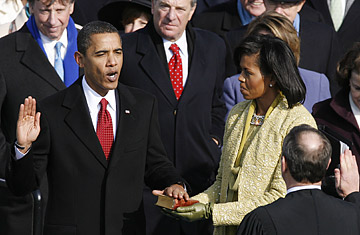
The 44th President of the United States, Barack Obama, takes the oath given by U.S. Supreme Chief Justice John Roberts, Jr. during the inauguration ceremony in Washington, January 20, 2009.
(3 of 6)
Actually, Obama was resisting in the name of balance: the bulk of his proposed stimulus package will probably go to short-term fixes--his promised $300 billion in tax breaks for the middle class, $200 billion in aid to cities and states, benefits for the poor and unemployed. Even so, aides say, most of Obama's attention has been focused elsewhere--on long-term stimulus projects, the larger transformations in the economy, the health-care system and foreign policy. Quietly, the Obama transition team reviewed every government agency "to find out which specific programs were working and which weren't." It was a terrifyingly brisk and comprehensive process, especially compared to the dust storm produced by the last Democratic President, Bill Clinton, during his chaotic transition period. "During Clinton's transition, you had all these people writing ad hoc papers about what to do at this agency or how to deal with that policy, but that was an extension of how Clinton's mind works," says one of the many Obama aides who is a veteran of the Clinton Administration. "Clinton had this great horizontal intelligence. He could pull an idea from a meeting he had in northern Italy and apply it to spreading broadband service through Iowa. It was amazing but not exactly efficient. Obama is more vertical. He pushes the process along, streamlines it. We had one 25-to-50-page policy paper for every agency."
Well, that's Democrats for you. It's hard to imagine any Republican President since Reagan wanting to rummage through all that paper or being fastidious enough to care about the strengths and weaknesses of every federal agency. If government was the problem, as Reagan suggested, the solution, theoretically, was less of it--and since reducing government proved impossible, as opposed to reducing taxes, there didn't seem to be all that much interest in actually making it work more efficiently. By contrast, Obama and his eclectic team of appointees give the impression of being positively intoxicated by the prospect of figuring out how everything works. Obama's closest aides like to say he isn't a "wonk" like Clinton, immersed in policy details to the point of immobility, but clearly the new President has a breadth and depth of policy interests, especially in comparison with his immediate predecessor.
In some ways, the most surprising of his appointments--Hillary Clinton, the new Secretary of State--has emerged as an exemplar of Obamism. At her confirmation hearing, Clinton seemed completely prepared on every imaginable topic, orderly, undramatic and yet willing to propose some radical changes in the State Department's structure. She seems intent on tilting the department away from its stultifying bureaucratic orthodoxies and toward solving specific problems. To do so, she will appoint no fewer than five, and perhaps more, high-profile special envoys who will do the heavy lifting and share her spotlight on the most vexing foreign policy problems--former Senator George Mitchell to calm down the Middle East, Richard Holbrooke to deal with the Afghanistan-Pakistan nexus, and others for Iran, North Korea, the global-climate-change treaty negotiations and possibly another for the ever forgotten neighbors to our south.
